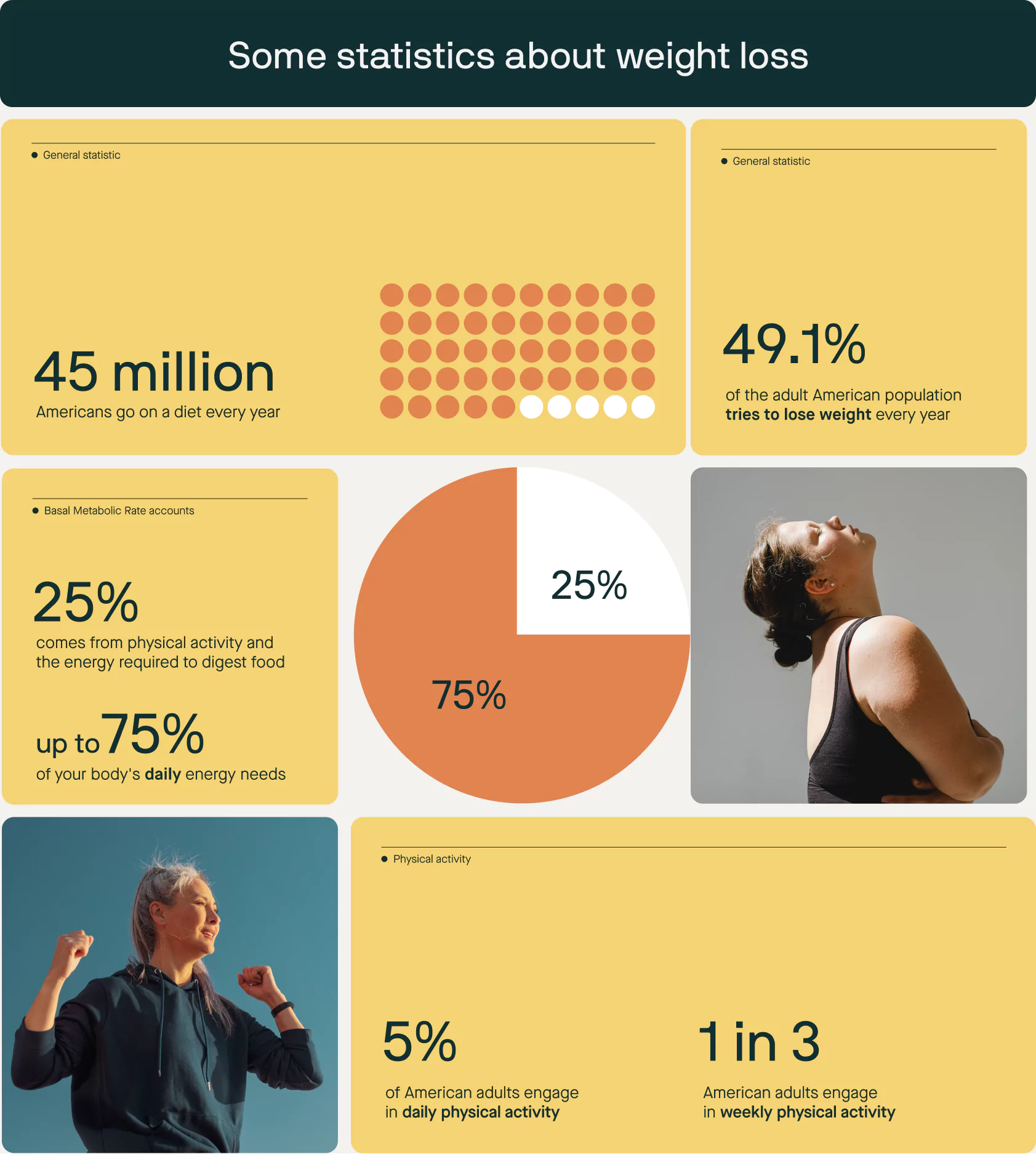Weight Loss and Glucose (+ Prediabetes Connection)

Key Takeaways
You’ve probably heard that glucose affects energy. But did you know, it can also shape how easily (or not) you lose weight? When glucose levels swing up and down throughout the day, your body gets mixed signals. Instead of burning fuel efficiently, it starts holding on to fat, making weight loss feel harder than it should. Understanding your glucose response helps you see why your body reacts the way it does, and what changes actually move the needle.
Highlights:
- Strength training builds muscle mass, which helps your body regulate glucose levels and enhances insulin sensitivity.
- Explore how tracking your glucose with a CGM or glucose biosensor can reveal your body's unique response to food and exercise.
- The Nutrisense program is currently available to customers within the United States.
- All programs include the option to book insurance-covered calls with a registered dietitian who can help you build a personalized plan.
You’ve probably heard that glucose affects energy. But did you know, it can also shape how easily (or not) you lose weight? When glucose levels swing up and down throughout the day, your body gets mixed signals. Instead of burning fuel efficiently, it starts holding on to fat, making weight loss feel harder than it should. Understanding your glucose response helps you see why your body reacts the way it does, and what changes actually move the needle.
Highlights:
- Strength training builds muscle mass, which helps your body regulate glucose levels and enhances insulin sensitivity.
- Explore how tracking your glucose with a CGM or glucose biosensor can reveal your body's unique response to food and exercise.
- The Nutrisense program is currently available to customers within the United States.
- All programs include the option to book insurance-covered calls with a registered dietitian who can help you build a personalized plan.
If one of your goals this year is to finally feel in control of your weight, you’ve probably tried tracking calories, cutting carbs, or switching plans. And still, progress feels unpredictable. Wherever you are in your journey, remember that lasting weight loss isn’t just about willpower. It’s about learning how your metabolism really works.
Weight gain, especially if it leads to obesity, may have negative effects on your overall health. But if you’re thinking losing weight at any cost will help you get all the health benefits of weight loss, think again.
Some researchers have pointed out that you can be healthy at any size through targeting lifestyle habits that support metabolic health as a whole. Focusing on healthy habits can also reduce your risk factors for heart disease and type 2 diabetes, kidney and liver disease, and other health issues associated with an unhealthy weight.
Wondering how glucose fits into all this, and whether it could be the missing link between effort and results? Still unclear about your metabolism and how things like high glucose, prediabetes, and weight gain are connected to it? Read on to find out!
Why is weight loss so challenging?

Estimates show over 45 million Americans go on a diet every year. And studies have shown that 49.1 percent of the adult American population tries to lose weight every year. Unfortunately, not all of these people reach their weight loss goals or improve their overall health while they’re attempting to do so.
Undereating and balance
If you’ve been eating less but not losing weight, you’re not imagining it. Undereating can actually slow your metabolism and make your body hold on to fat. Other factors impacting your weight loss progress can include your nutritional balance.
This goes beyond calories and includes how macronutrients (protein, carbs, fat) and micronutrients (vitamins, minerals) are balanced in your diet. It also includes how you combine and time your foods throughout the day.
Physical activity rates
Another contributing factor may be an inappropriate amount of physical exercise, especially in the US. In fact, only five percent of American adults engage in daily physical activity, and only one in three adults are involved in any physical activity weekly.
Risks of inactivity
This lack of physical movement can increase the risk factors for obesity and other conditions, including high blood pressure, cholesterol, prediabetes, and mental health issues.
What is your metabolism and how does it work?

Your metabolism governs energy balance, but also much more. Metabolism includes the total of all chemical reactions taking place in your body to keep you alive. This includes energy balance as well as making and repairing DNA, tissues, and other molecules essential for life, like hormones.
Age and activity
Your metabolic rate, or how your body regulates energy balance, depends on age, current weight, level of physical activity, and genetics. The basal metabolic rate (BMR) is one way to determine some of this. Specific formulas can help you calculate the BMR, but it can be pretty complicated to do yourself if you’ve never done so before.
Dietitian support
A registered dietitian can help you calculate your BMR and understand more about the calories your body requires depending on things like your age, weight, and height. But of course, healthy weight loss isn’t just about calories in versus calories out.
Understanding other factors that impact metabolism such as the role of hormones, stress, and nutrient intake is crucial.
Why is healthy weight loss important?

Not everyone’s metabolic rate works the same. Some people have a fast metabolic rate, while others might have a slow metabolic rate. For people with a slow metabolic rate, weight loss can be even more challenging.
Lean muscle mass
Are you wondering why people with low lean muscle mass and high-fat mass are prone to slow metabolic rate? It’s because your muscle cells use more energy, even at rest. If weight loss is your goal and you have a slow metabolic rate, consider exploring ways to improve your lean muscle mass.
If you’re focusing on your diet, remember that healthy weight loss is much more important than just losing weight. There’s no one-size-fits-all, and body weight is not always the best way to determine overall health.
Consult your clinician or a healthcare professional
So even if you're considering dietary changes to support this, don’t make any drastic changes without consulting a healthcare professional first.
Find the right Nutrisense programto turn insight into progress.
Weight loss isn’t just calories. See what your glucose reveals about your metabolism.
Weight loss isn’t just calories. See what your glucose reveals about your metabolism.
How are glucose and weight linked?

After every meal, your body produces insulin, a hormone that influences how your body moves and stores energy from glucose. If you consume more glucose than your body needs at the time, your liver and muscles may store the excess as glycogen and even fat.
High sugar intake
If your sugar intake is much higher for an extended period, your body may begin to experience changes in fat storage over time. This leads to the increased risk of diseases like type 2 diabetes and obesity. Keeping glucose balanced may positively impact how your body stores and uses nutrients.
Insulin resistance
Chronic elevated sugar levels can also lead to insulin resistance, where your cells stop responding normally to insulin. This keeps glucose in your bloodstream even longer. With very high insulin levels, your body doesn’t receive the signal to use glycogen and fat for energy. This ends up affecting your efforts at weight loss.
What resources can help you start?
{{rich-text-cta-wl2="/style-guide"}}
Should you track glucose not calories for weight loss?

Added sugars can be one of the most significant deterrents to your weight loss goals. The American Heart Association suggests an added-sugar limit of no more than 100 calories per day (about 6 teaspoons or 24 grams) for most adult women and no more than 150 calories per day (about 9 teaspoons or 36 grams of sugar) for most men.
Typical scenario
You ate the healthy grain bowl for lunch, but by 3 p.m., you’re fighting intense sugar cravings and a wave of fatigue. You’ve followed all the rules, but your body seems to have a mind of its own, leaving you frustrated and wondering why your healthy choices aren’t leading to results.
Glycemic index
Another way to track your sugar intake is to consider the glycemic index of your food. Food with a glycemic index under 55 is usually a good option for most people, especially if your goal is to lose weight and improve glucose levels.
However, glycemic load, which takes into account the overall amount of a given food you are eating, is the best way to apply the principle of glycemic index. Another tool to add to your weight loss toolbox is a continuous glucose monitor (CGM) or glucose biosensor.
Glucose biosensor or CGM insights
A CGM gives you an in-depth picture of how your body responds to food, stress, and sleep: no guessing, no crash diets. It’s a cost-effective way of tracking your glucose, because you can see 24/7 glucose responses to food and lifestyle habits.
You’ll start to notice patterns based on how your glucose fluctuates, like why that “healthy” smoothie leaves you starving two hours later, or why late dinners stall your progress. By monitoring this, you can better understand how your diet and lifestyle habits influence your glucose levels and your risk of metabolic health concerns over time.
A registered dietitian can help translate those patterns into practical next steps, so you can stop guessing and start seeing steady results. They can help you understand your glucose levels, improve nutrient balance, and create custom approaches to diet and lifestyle changes, so you can focus on healthy weight management.
How does prediabetes fit into this?
Prediabetes often stays silent, so lab testing gives the clearest status check. Clinicians use three standard diagnostic tests and cutoffs per the ADA Standards of Care in Diabetes—2025:
- A1C: 5.7–6.4%.
- Fasting plasma glucose: 100–125 mg/dL.
- 2-hour OGTT value: 140–199 mg/dL.
Common flags that prompt testing include increased thirst and urination, fatigue, and acanthosis nigricans (dark, velvety skin on the neck, armpits, or groin). Evidence links acanthosis nigricans with insulin resistance and impaired glucose tolerance.
Remember, a continuous glucose monitor (CGM) cannot diagnose prediabetes. The ADA states there is insufficient evidence to use CGM for screening or diagnosis; diagnosis relies on plasma glucose or A1C criteria. A CGM can still reveal patterns around meals, activity, stress, and sleep to support care conversations and behavior change.
Weight loss and glucose monitoring FAQ
Q1. Do I need a prescription to start the Nutrisense CGM program?
A1. No prescription is required to start. If you sign up for the Nutrisense CGM program, it currently ships only within the United States. You will register, receive your glucose biosensors, download the app, and start tracking.
Source: How Nutrisense Works
Q2. How long does each sensor last, and how many will I receive per month?
A2. Your sensors depend on the length and duration of the program chosen. You can also bring your own! The program is a subscription that renews monthly after the initial commitment. You can manage your plan in the app or by contacting support if you need changes.
Source: CGM Plans
Q3. Can I wear the Nutrisense program sensor in water or during workouts?
A3. Yes. The sensor is waterproof for daily bathing, showering, and swimming. For best performance, avoid exposing it to extreme temperatures, such as saunas or ice baths. You can be active while wearing it, including gym workouts and outdoor activities, as long as the sensor is protected from direct impact.
Source: How Nutrisense Works
Q4. Are dietitian video calls included, and can insurance cover them?
A4. All programs include the option to schedule 1: 1 video calls with a registered dietitian or certified nutritionist. Nutrisense accepts many insurance plans and offers a free eligibility check, so your calls can be covered by insurance if eligible! You can also opt for self-pay. Sessions center on reviewing glucose patterns and daily habits, then tailoring food, activity, sleep, and stress strategies to your goals.
Source: Nutritionist Video Calls
Q5. Can I use my own CGM with the Nutrisense App?
A5. Yes. The Bring Your Own Sensor plan lets you use the Nutrisense App with a compatible CGM you already have. You get access to analytics such as meal logging and glucose trends, and you can add coaching if desired. Check the plan for supported devices and current terms.
Source: Bring Your Own Sensor
How can Nutrisense help you use glucose data?
Your glucose levels influence more than energy. They affect cravings, focus, and how easily your body releases stored fat. Keeping it steady is key to feeling your best. But viewing glucose isn't enough. With Nutrisense, you’ll learn how to use your body's data to make informed lifestyle choices that support healthy living.
Dietitian guidance
Sign up for insurance-covered video calls to work with a glucose expert: a personal registered dietitian or certified nutritionist who will help tailor your lifestyle and diet to your goals.
CGM and app
With the Nutrisense CGM Program, you can monitor your glucose with health tech like glucose biosensors and continuous glucose monitors (CGMs), and analyze the trends over time with the Nutrisense App. This will help you make the most informed choices, so you can eat, move, and recover in ways that support lasting weight loss.
Get started
Ready to see what’s really driving your progress? Take the quiz to find your personalized Nutrisense program.
Go Beyond Glucose Data with Nutrisense
Your glucose can significantly impact how your body feels and functions. That’s why stable levels are an important factor in supporting overall wellbeing. But viewing glucose isn't enough. Nutrisense, you’ll be able to learn how to use your body's data to make informed lifestyle choices that support healthy living.
One-to-one coaching
Sign up to access insurance-covered video calls to work with a glucose expert: a personal registered dietitian or certified nutritionist who will help tailor your lifestyle and diet to your goals.
Monitor and measure what matters
With the Nutrisense CGM Program, you can monitor your glucose with health tech like glucose biosensors and continuous glucose monitor (CGM)s, and analyze the trends over time with the Nutrisense App. This will help you make the most informed choices about the foods you consume and their impact on your health.
Find your best fit
Ready to take the first step? Start with our quiz to find the right Nutrisense program to help you take control.

Kara Collier is a registered dietitian nutritionist and certified nutrition support clinician who is passionate about reshaping how we approach prevention, behavior change, and metabolic health. A Forbes 30 Under 30 honoree, she’s helped over 150,000 people improve their metabolic health using tools like continuous glucose monitors and behavior-focused nutrition strategies. Kara has been featured by Forbes, UC Berkeley, and HLTH, and has appeared on top podcasts like Mind Pump and The Genius Life.




